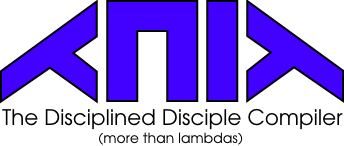Difference between revisions of "Discus"
Jump to navigation
Jump to search
| Line 22: | Line 22: | ||
* Is an active research project and is not yet "industrial strength", but will compile some programs if you're nice to it. |
* Is an active research project and is not yet "industrial strength", but will compile some programs if you're nice to it. |
||
| − | == |
+ | == Development == |
| ⚫ | |||
| − | Get the latest stable release (alpha 1.1) with [http://darcs.net darcs]: |
||
| − | darcs get http://code.haskell.org/ddc/ddc-alpha |
||
| − | |||
| − | For thrill-seekers, the development branch (which usually builds ok) is: |
||
| − | darcs get http://code.haskell.org/ddc/ddc-head |
||
| − | |||
| − | Check the [[DDC/ReleaseNotes-Alpha1.1|ReleaseNotes]] and [http://code.haskell.org/ddc/ddc-head/INSTALL INSTALL] and [http://code.haskell.org/ddc/ddc-head/doc/HACKING HACKING] instructions. |
||
| − | |||
| − | == Hackery == |
||
* If you've tripped over a bug then please add a [http://trac.haskell.org/ddc/newticket New Ticket]. |
* If you've tripped over a bug then please add a [http://trac.haskell.org/ddc/newticket New Ticket]. |
||
| ⚫ | |||
* You can also post in http://groups.google.com/group/disciple-cafe. |
* You can also post in http://groups.google.com/group/disciple-cafe. |
||
| ⚫ | |||
* Or ask in #disciplined on irc.freenode.net |
* Or ask in #disciplined on irc.freenode.net |
||
| ⚫ | |||
Revision as of 05:45, 23 July 2009
Disciple is an explicitly lazy dialect of Haskell which supports destructive update, computational effects, type directed field projections and allied functional goodness.
Disciple vs Haskell
- Strict EvaluationOrder is the default, laziness is introduced explicitly.
- Type directed FieldProjections complement type classing.
- All data objects support DestructiveUpdate.
- The EffectSystem tracks what computational effects are being used in a program, without the need for state monads.
- The ClassSystem ensures that effects and destructive update play nicely with laziness.
- ClosureTyping is used to track data sharing, and to preserve soundness in the presence of PolymorphicUpdate.
- Some FurtherReading.
Some example code showing most of the extensions, and its output, core and C-code
The Disciplined Disciple Compiler
- Uses a typed core language which includes effect, closure, region and mutability information.
- This extended type information is used to allow code-transformation style optimizations in the presence of side effects and mutable objects.
- Compiles via standard C99, so is highly portable.
- Tested on linux-{x86, x86_64} and darwin-{x86, x86_64} (tested on 10.5.4)
- Is an active research project and is not yet "industrial strength", but will compile some programs if you're nice to it.
Development
- See the Development Wiki for getting and building instructions.
- If you've tripped over a bug then please add a New Ticket.
- You can also post in http://groups.google.com/group/disciple-cafe.
- Or ask in #disciplined on irc.freenode.net
- Or send mail to Ben.Lippmeier (wibble) anu.edu.au
